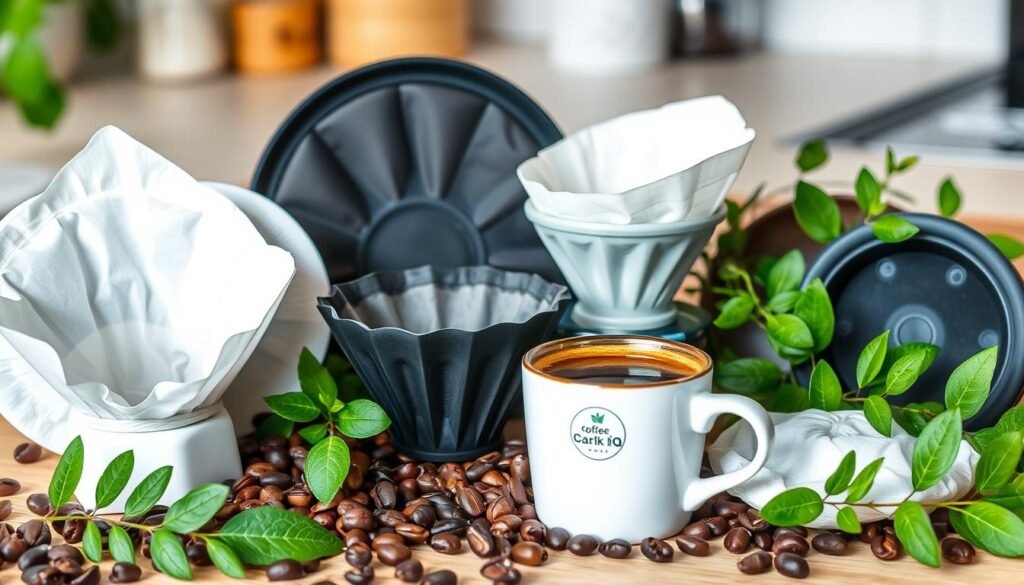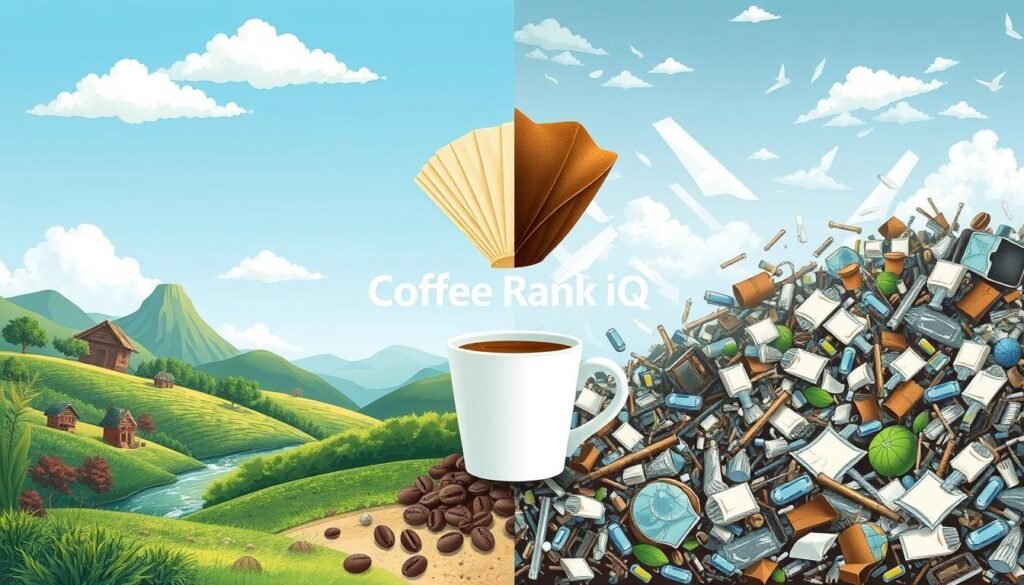Did you know that over 100 million coffee filters are used and discarded daily in the United States alone? This staggering statistic highlights the pressing need to explore more eco-friendly alternatives to the traditional paper filter. As coffee enthusiasts, your choice of coffee filter can have a significant impact on the environment, and it’s time to weigh the pros and cons of reusable versus disposable options.
Key Takeaways
- Paper coffee filters produce high levels of waste, while metal and cloth filters offer more sustainable options with minimal to zero waste.
- Permanent filters like metal and cloth can provide a richer, bolder coffee flavor compared to the lighter, cleaner taste of paper filters.
- Reusable filters require more upfront investment but can last for years, potentially saving money in the long run.
- Choosing the right coffee filter involves balancing factors like convenience, flavor, and environmental impact to suit your personal preferences.
- Switching to a more eco-friendly coffee filter is a simple yet impactful step you can take to reduce your carbon footprint and support sustainable coffee consumption.
The Brewing Battle: Paper vs. Permanent Filters
Understanding the Difference: Flavor, Convenience, and Sustainability
When it comes to brewing the perfect cup of coffee, the choice between paper and permanent filters can make a significant difference in the final flavor profile, brewing convenience, and environmental sustainability. Paper filters are known for producing a cleaner, brighter, and more approachable cup, as they absorb the natural oils and micro-grounds that can contribute to a bolder, richer taste. On the other hand, permanent filters, such as metal, cloth, and ceramic variants, allow more of these elements to pass through, resulting in a more full-bodied and aromatic brew.
Paper Filters: The Classic Choice
Paper coffee filters come in a variety of shapes, including conical, basket, and disk, as well as different sizes to accommodate various brewing needs. Bleached paper filters are whitened using chlorine or oxygen bleach, which can have a negative impact on the environment, while unbleached filters are a more eco-friendly option, though they may impart a papery taste if not properly rinsed. Paper filters remain the traditional choice for many coffee drinkers, as they offer a convenient and easy-to-use solution, but they can also mute some of the natural flavors and aromas of the coffee.
Permanent Filters: A More Eco-Friendly Option
Permanent coffee filters come in a range of materials, including metal, cloth, and ceramic. Metal filters are known for their durability and ease of cleaning, producing a rich, bold, and aromatic brew, but they may allow some micro-grounds to pass through. Cloth filters offer a middle ground, capturing more particles while still preserving the coffee’s natural oils and flavors, but they require more frequent maintenance. Ceramic filters, originating from Japan, are praised for creating an unparalleled taste experience, though they are also fragile and high-maintenance. Permanent filters are considered more eco-friendly than their disposable paper counterparts, as they eliminate the need for single-use filters and reduce overall waste.
Ultimately, the choice between paper and permanent coffee filters comes down to personal preference, brewing style, and the importance placed on factors such as flavor, convenience, and environmental sustainability. By understanding the unique characteristics of each filter type, coffee enthusiasts can make an informed decision that aligns with their individual brewing needs and preferences.
Reusable vs. Disposable Coffee Filters: An Eco-Friendly Comparison
When it comes to brewing a perfect cup of coffee, the choice between reusable and disposable filters can have a significant impact on the environment. Disposable paper filters are a common choice, but their growing use and disposal contribute to the growing waste problem. In the U.S. alone, an estimated 100 million paper filters are used and discarded daily.
Switching to reusable coffee filters, whether made of metal, cloth, or even biodegradable paper, can greatly reduce this environmental impact by minimizing waste and promoting a more sustainable coffee brewing routine. While reusable filters may have a higher initial cost, they ultimately prove to be a more affordable and eco-friendly choice in the long run, as they can be used repeatedly without the need for constant replacement.
Unbleached paper coffee filters are considered more eco-friendly than their bleached counterparts, and they come in a variety of shapes, including conical, basket, and disk filters. Reusable metal filters are known for their durability and ability to produce a richer brew, but they may allow micro-grounds to seep through. Cloth filters offer a middle ground, providing a sustainable option that requires regular maintenance.
“Reusable coffee filters are designed to be used over and over again, reducing the need for single-use paper filters. This helps minimize waste and promote a more sustainable coffee brewing experience.”
The choice between reusable and disposable coffee filters ultimately comes down to personal preference, lifestyle, and environmental consciousness. By considering the long-term benefits and the impact on the environment, coffee enthusiasts can make an informed decision that aligns with their values and contributes to a more sustainable future.
Exploring the Realm of Reusable Coffee Filters

As coffee enthusiasts become increasingly conscious of their environmental impact, the spotlight shines brightly on the world of reusable coffee filters. Gone are the days when disposable paper filters were the only option, as a growing number of eco-friendly alternatives emerge to challenge the status quo.
Metal Filters: Robust and Long-Lasting
Metal coffee filters, often crafted from stainless steel or titanium, have gained significant popularity among sustainability-minded coffee drinkers. These resilient filters are renowned for their exceptional durability, with many lasting a lifetime when properly maintained. The metal construction not only ensures longevity but also allows for easy cleaning, whether by hand or in the dishwasher. While metal filters may produce a richer, more full-bodied brew due to the inclusion of natural oils and micro-grounds, some users may find the resulting mouthfeel slightly heavier than the familiar paper filter experience.
Cloth Filters: A Sustainable Middle Ground
Cloth coffee filters offer a sustainable middle ground between disposable paper and long-lasting metal options. Commonly made from materials such as linen, hemp, or organic cotton, these filters capture most of the coffee’s particles while still allowing some of the natural oils to pass through, resulting in a clean, aromatic, and bright brew. However, cloth filters require more maintenance, as they need to be washed and boiled regularly to prevent clogging and off-flavors from previous brews. The environmental benefits of cloth filters are undeniable, as they produce significantly less waste than their disposable counterparts.
As the coffee industry continues to face challenges related to sustainability and waste, the rise of reusable coffee filters stands as a testament to the growing consumer demand for eco-friendly solutions. By embracing these innovative alternatives, coffee enthusiasts can enjoy their daily brew while minimizing their environmental footprint.
The Environmental Impact of Coffee Filters

The environmental impact of coffee filters is a significant concern in the pursuit of sustainable coffee consumption. With an estimated 100 million disposable coffee filters being used and discarded daily in the United States alone, this massive amount of waste contributes to the growing global plastic pollution crisis. Switching to reusable coffee filters can be a crucial step towards reducing waste and minimizing the environmental footprint of your coffee routine.
Reducing Waste: A Crucial Step Towards Sustainability
Reusable coffee filters, whether made of metal, cloth, or biodegradable paper, offer a more eco-friendly alternative to their disposable counterparts. Metal filters, typically crafted from stainless steel or titanium, provide long-term usage without the need for frequent replacement. Cloth filters, made of natural fibers like cotton or hemp, can be washed and reused multiple times, enhancing the flavor of your coffee while being kind to the environment. Even paper coffee filters are becoming increasingly popular, as they are biodegradable and compostable, contributing to less waste if disposed of correctly.
By making the switch to reusable coffee filters, you can significantly reduce the amount of waste generated from your daily coffee routine. This not only helps to combat the growing issue of plastic pollution but also aligns with the goal of living a more eco-friendly lifestyle. The long-term reusability of these filters also makes them a cost-effective choice, as the initial investment can be offset by the reduced need for constant filter replacement.
While the choice of filter type may be influenced by personal preferences, it is important to consider the environmental impact of your decision. By opting for reusable coffee filters, you can take a meaningful step towards sustainable coffee consumption and reduce your overall waste production. This small but impactful change can contribute to a healthier planet and a more eco-conscious lifestyle.
Cost Considerations: The Long-Term Value of Reusable Filters
When it comes to brewing your daily cup of coffee, the choice between disposable paper filters and reusable options like metal or cloth filters may seem like a simple one. However, the long-term cost implications of these decisions can have a significant impact on your wallet and the environment.
While reusable coffee filters may carry a higher initial price tag compared to their paper counterparts, they offer substantial long-term savings. By investing in a quality reusable filter, whether it’s made of metal, cloth, or even biodegradable paper, you eliminate the need to continuously purchase and replace disposable filters. This not only reduces the financial strain but also aligns with the growing trend of eco-friendly consumerism, where individuals prioritize making sustainable investments that have a positive impact on the environment.
Unbleached paper coffee filters are considered more eco-friendly than their bleached counterparts, as the chlorine and bleach used in the whitening process can negatively impact the environment. In contrast, reusable filters provide a long-term, cost-effective, and sustainable solution, reducing your carbon footprint and contributing to a healthier planet.
“Choosing a reusable coffee filter is not only a smart financial decision but also a conscious step towards a more eco-friendly lifestyle.”
The upfront cost of a reusable filter may seem like a deterrent, but when you factor in the long-term savings and the positive environmental impact, the choice becomes clear. Invest in a reusable filter today and enjoy the benefits of a cost-effective and sustainable coffee brewing experience for years to come.
Conclusion
In the pursuit of the perfect cup of coffee, the choice between reusable and disposable coffee filters is a decision that requires careful consideration. As the world becomes increasingly conscious of the need for sustainable practices, the use of reusable coffee filters, whether made of metal, cloth, or biodegradable paper, offers a compelling solution that can reduce waste, minimize environmental impact, and provide a delicious and satisfying coffee experience.
By understanding the unique characteristics and benefits of each filter type, coffee enthusiasts can make an informed decision that aligns with their values and lifestyle. Whether you prioritize balancing flavor and sustainability or simply seek to choose the right coffee filter for your brewing needs, the options available provide a range of eco-friendly alternatives to the traditional disposable paper filters.
Ultimately, the decision to embrace eco-friendly coffee brewing is one that not only enhances your personal coffee ritual but also contributes to a more sustainable future for coffee consumption. By considering the long-term value and environmental impact of your filter choice, you can enjoy a delightful cup of coffee while making a meaningful difference in the world around you.
FAQ
What are the key differences between paper and permanent coffee filters?
According to the first source, paper filters produce a lighter, crisper, and cleaner cup of coffee by absorbing the natural oils and micro-grounds, but this also results in the loss of certain flavors and aromas. Permanent filters, on the other hand, allow these elements to pass through, resulting in a bolder, richer, and more aromatic brew.
What are the main types of permanent coffee filters and their characteristics?
The first source provides an in-depth look at the different types of permanent coffee filters, including metal, cloth, and ceramic. Metal filters are durable and easy to clean, producing a rich, bold, and aromatic brew, but may allow some micro-grounds to pass through. Cloth filters offer a middle ground, capturing more particles while still preserving the coffee’s natural oils and flavors, but require more frequent maintenance. Ceramic filters, originating from Japan, are described as creating an unparalleled taste experience, though they are also fragile and high-maintenance.
What are the environmental benefits of using reusable coffee filters?
The third source highlights that the use of disposable coffee filters is a significant contributor to the growing waste problem, with an estimated 100 million filters being used and discarded daily in the US alone. Switching to reusable coffee filters, whether made of metal, cloth, or biodegradable paper, can greatly reduce this environmental impact by minimizing waste and promoting a more sustainable coffee brewing routine.
How do the costs of reusable and disposable coffee filters compare in the long run?
According to the first and third sources, while reusable coffee filters may have a higher initial cost compared to disposable paper filters, they prove to be a more cost-effective and sustainable choice in the long run. The upfront investment in a quality reusable filter is offset by the elimination of the need to continuously purchase and replace disposable filters.




